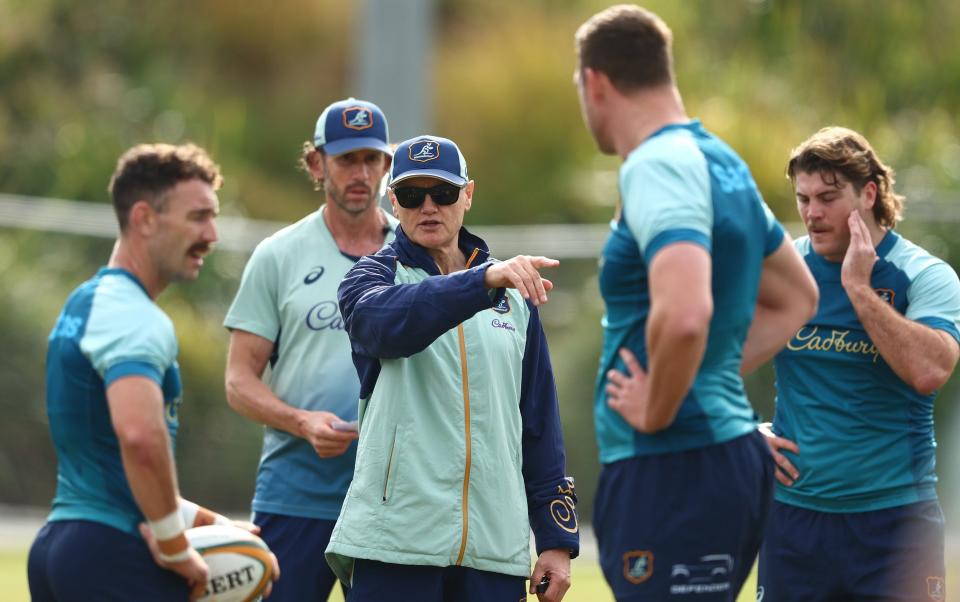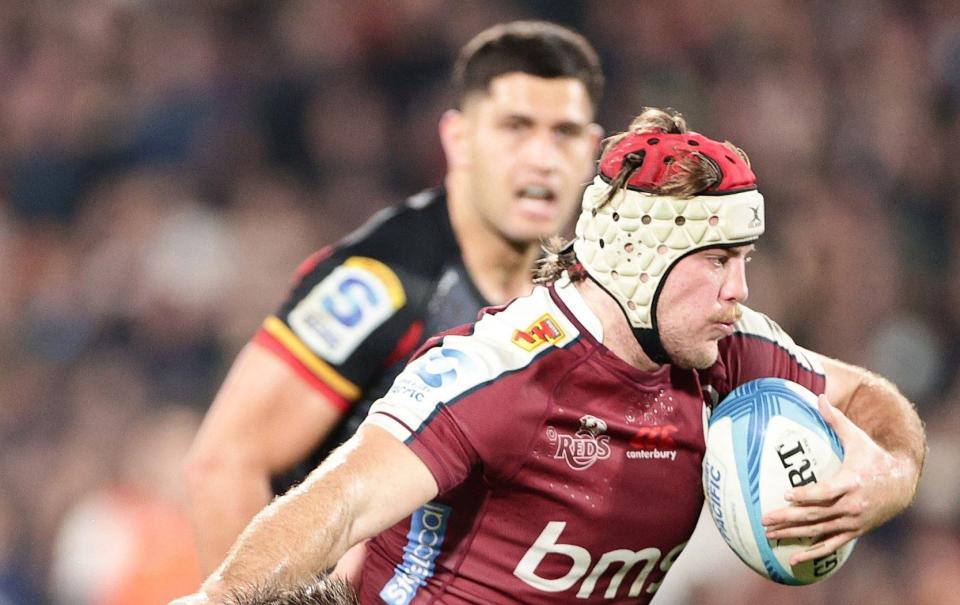
Modern rugby union gets a bad rap for being homogenous. Matches sometimes feel like a contest between two sides that play in a similar fashion; box-kicking to control territory, running three-man pods of forwards with a fly-half out the back, rolling back-rowers out of mauls to pass into midfield.
Nonetheless, you tend to know a Joe Schmidt team when you see one. Renowned for his diligence and attention to detail, the 58-year-old is a veritable professor of the sport. During a recent press call, he was asked about the Blues’ pick-and-go strategy and whether New Zealand, his previous team, might adopt something similar.
Schmidt explained how he and Vern Cotter, the Blues boss, had implemented those tactics together at Bay of Plenty in the early 2000s. He then rattled off three Clermont forwards – Thomas Domingo, Elvis Vermeulen and Mario Ledesma – who relished that approach while Schmidt and Cotter were in France. Finally, Schmidt cited the weight of Caleb Clarke at “108 athletic kilos”, underlining how the Blues wing contributed to this “confrontational, dynamic style”.
Truly, he is a talking encyclopaedia and seems fiercely motivated for his latest role; the fascinating challenge of fixing Australia ahead of a British and Irish Lions tour in 2025 and a home World Cup two years after that. The road towards those exciting milestones begins on Saturday as the Wallabies host Wales in Sydney.
Schmidt is inheriting a team that crashed out of the 2023 World Cup at the pool stage under Eddie Jones, losing 40-6 to Warren Gatland’s team along the way. One suspects that they may be more coherent over the coming weeks, even with seven potential debutants in Australia’s first match-day 23 of the year and a new captain in Liam Wright, the combative Reds back-rower.
Here are the Schmidt signposts to watch out for.
A strike-move repertoire
Everyone has a story about a Joe Schmidt special. Alex King, now part of the Wales set-up, transitioned into coaching at Clermont under a Schmidt-Cotter ticket. He remembers the build-up to the 2010 Top 14 final. On the Thursday, Schmidt “adapted” a line-out move.
Two days later, 16 minutes into the decider at Stade de France, the tweak saw Aurélien Rougerie gather a deep miss-pass from Brock James and step back inside. That fixed two Perpignan defenders and Anthony Floch burst into space. The break brought about the sole try of a tight contest that Clermont won 19-6.
Bundee Aki tore through England at Twickenham in 2018 from Tadhg Furlong’s pirouetting pass, leading to a try for CJ Stander. Schmidt later reminded journalists that Ireland had tried a similar shape in 2015, with Tommy O’Donnell spinning to feed Robbie Henshaw. Unfortunately, the latter lost his footing.
Schmidt’s rendezvous with Ireland in the 2023 World Cup quarter-final hinged upon another clever piece of choreography. New Zealand called an unusual four-man line-out and packed the backline with three forwards. Counterintuitively, those bodies presented a hole at the ‘seam’ of the defence for Richie Mo’unga, who flashed a dummy to his inside before darting clear, scuttling 40m and feeding Will Jordan.
Other Schmidt favourites include the famous dummy loop from scrum-half – a version of which was unleashed by Northampton Saints in the Premiership final, with Courtney Lawes finding a slicing George Furbank – and a distinctive play that sees a stack of runners slide around a ruck together.
Jonathan Fisher, now an assistant coach at the Reds, underlines the precision that Schmidt demands from players’ running lines, particularly over the first three phases after a set-piece. Dummy runners are urged to add to the deception with animation, holding up their hands to attract defenders.
Australia have had a short build-up, with their head coach claiming that he has “never been as underprepared”. With carriers such as titanic tighthead prop Taniela Tupou, Hunter Paisami in midfield and Rob Valetini in the back row, Schmidt is sure to unfurl some trademark trickery.
Breakdown ‘violence’ and ruck-based attack
Schmidt is a stickler for details. Brian O’Driscoll wrote about a video review of the thriller between Ireland and the All Blacks in 2013, when Kieran Read tracked Rob Kearney’s interception all the way to the try-line. Such endeavour, even as New Zealand trailed 14-0, kept the conversion out wide. Johnny Sexton missed the kick and, famously, the All Blacks completed a last-gasp comeback to win by two points.
Fisher attended Wallabies training last Tuesday and discerned a stark focus on the contact area. “Joe speaks with real passion about the way you present the ball on the floor, the way you clean an attacking breakdown and how players work together – the expectations on support players either side of the carrier,” he said.
“I think the core basics, and their ability to retain possession, will be a strength [for Australia]. That will certainly suit the playing personnel they have there in the squad. I think with Joe, the team will be ruthless.”
A defence coach who faced Ireland under Schmidt summed up the latter’s outlook on the ruck in two words: “urgency and violence”. Fisher predicts that Tate McDermott, a scurrying scrum-half who begins on the bench against Wales with Jake Gordon starting, will thrive with quick, clean ball. He is also excited to watch openside flanker Fraser McReight, a breakdown scavenger who has put on around 6kg since the World Cup, for the Wallabies.

Between 2014 and 2019, a period that yielded three Six Nations titles under Schmidt, Ireland adopted a certain style. They resisted offloading (completing 7.8 per game against an average of 11.6 across all teams in the tournament, according to Stats Perform) and amassed 123 rucks per match (higher than the average of 114). Four of the top five team tackle counts in Six Nations history have come against Schmidt’s Ireland sides. They knew how to hang on to possession.
‘Granite basics’ and referee management
Perhaps unsurprisingly, Schmidt has assembled a cerebral backroom team. Mike Cron, a wizened scrummaging guru, is part of the set-up with former England lock Geoff Parling coordinating line-outs and Laurie Fisher, another vastly experienced operator, looking after the forwards. Another intriguing appointment is Eoin Toolan, whom Schmidt met in Ireland a decade ago.
Toolan has combined analysis and coaching roles in Australia and Japan – as well as incisive punditry for the 42 – and seems to be in a hands-on position. Last week, according to Schmidt, he was “just chipping away on some of the skill tidy-ups that can make a difference for our backs particularly”. Schmidt will devise an efficient approach that allows Australia to accentuate the athleticism of their players. Charlie Cale, the rangy Brumbies No 8, is one to watch. He is among the replacements this weekend.
There is an emphasis on existing cohesion with nine Reds and seven Brumbies, including starting fly-half Noah Lolesio, in the 23 for Saturday. Fisher anticipates a Wallabies outfit with “granite basics” that shares a sharp, collective appreciation of tactical and technical expectations in any given situation. Under Schmidt, Ireland averaged 7.8 penalties across 25 Six Nations matches between 2014 and 2019, far below the tournament average of 11.6.
Prior to joining the Blues as a consultant, do not forget, Schmidt spent a year as World Rugby’s director of rugby and high performance. Part of his remit was to collaborate with match officials. He will be right on top of refereeing interpretations and trends. Given Australia shot themselves in the foot incessantly at the last World Cup, shipping 48 penalties in four pool matches, including 18 against Fiji, Schmidt should spur an improvement.
“I really would approach this Wallabies campaign with a healthy, healthy dose of optimism,” added Jonathan Fisher. “I’m not really paying any attention to what has happened over the past couple of years to influence what I think what they’re going to be like moving forward.”
Australia v Wales, 10.45am, Saturday, July 6, Allianz Stadium, Sydney, Live on Sky Sports
Australia: Tom Wright; Andrew Kellaway, Josh Flook, Hunter Paisami, Filipo Daugunu; Noah Lolesio, Jake Gordon; James Slipper, Matt Faessler, Taniela Tupou, Jeremy Williams, Lukhan Salakaia-Loto, Liam Wright (captain), Fraser McReight, Rob Valetini.
Replacements: Billy Pollard, Isaac Kailea, Allan Alaalatoa, Angus Blyth, Charlie Cale, Tate McDermott, Tom Lynagh, Dylan Pietsch.
Wales: Liam Williams; Josh Hathaway, Owen Watkin, Mason Grady, Rio Dyer; Ben Thomas, Ellis Bevan; Gareth Thomas, Dewi Lake, Archie Griffin, Christ Tshiunza, Dafydd Jenkins, Taine Plumtree, Tommy Reffell, Aaron Wainwright.
Replacements: Evan Lloyd, Kemsley Mathias, Harri O’Connor, Cory Hill, James Botham, Kieran Hardy, Sam Costelow, Nick Tompkins.
Article courtesy of
Source link